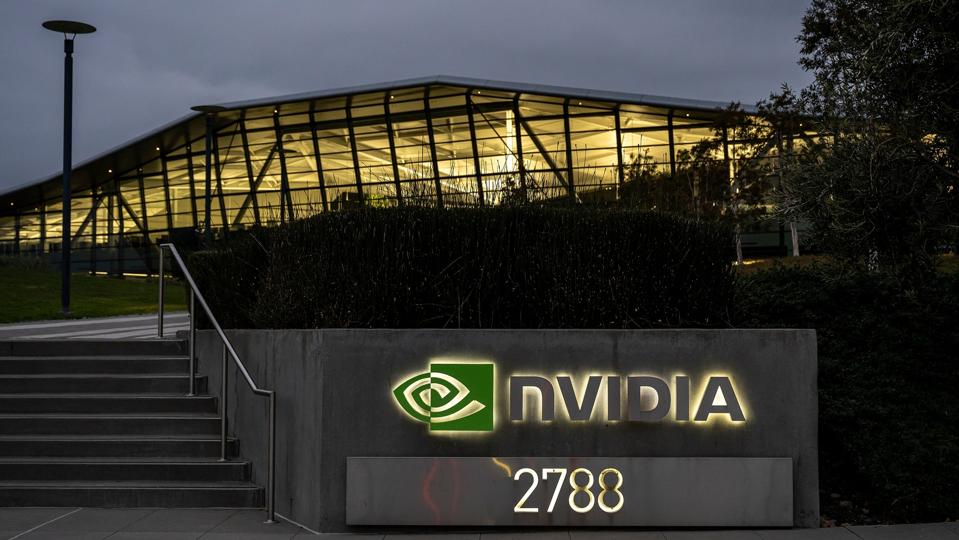Artificial intelligence heavyweight Nvidia became the latest company entangled in President Donald Trump’s global trade war this week, though Wall Street analysts say it’s far from a disaster scenario for the chipmaker.

This may be a “concession” from the Silicon Valley firm to get the White House to loosen further AI regulations, one analyst speculated.
© 2025 Bloomberg Finance LP
Key Facts
- Nvidia reported late Tuesday it expects to take a $5.5 billion hit this quarter due to the U.S.’ new severe restrictions on Nvidia exporting its H20 AI chips to China, curbs which pose an up to 10% earnings headwind for Nvidia this year, according to Bank of America analyst Vivek Arya.
- The H20 restrictions are an “unwelcome but somewhat expected, manageable risk” for Nvidia, explained Arya, leading a chorus of analysts largely interpreting the update as far from a worst-case scenario despite the brutal headline hit.
- It’s “not enormous in the grand scheme of things” as China accounted for the lowest proportion of Nvidia revenue in more than a decade last year at 13%, wrote Bernstein analyst Stacy Rasgon, while Rosenblatt analysts Kevin Cassidy and Kevin Garrigan predicted in a Wednesday note to clients.
- Nvidia can “make up most of this revenue” hit from China with sales of its latest graphics processing units (GPUs) outside of the Asian power.There’s a key “silver lining” to what is “effectively a ban” on Nvidia exporting its coveted AI technology to China, according to UBS analyst Timothy Arcuri: This may be a “concession” from the Silicon Valley firm to get the White House to “to effectively kill” the Biden administration’s most severe AI regulatory frameworks.
Tangent
Shares of Nvidia declined 7% Wednesday, wiping out nearly $200 billion in market capitalization. The losses for Nvidia, the most valuable company in the world other than Apple or Microsoft, dragged down the broader stock market, as the S&P 500 and Nasdaq dipped 1.2% and 1.9%, respectively. Hard hit were fellow semiconductor chip makers, as shares of Intel and TSMC both declined 3% and shares of Advanced Micro Devices tanked 6% after the company made a similar disclosure on losses tied to Chinese chip export curbs.
Chief Critic
Rasgon slammed the White House ban on Nvidia’s chips as making “little sense” as it “simply hands the Chinese AI market over to Huawei.”
Key Background
This is the latest evidence of a choppy operating environment for American technology companies. Deutsche Bank analyst Ross Seymore remarked “the ongoing volatility and resulting uncertainty surrounding the trade war between the US & China” has caused investors to be “whipsawed between hopes for exemptions/reconciliation and fears of further escalation.” The H20 chip curb comes less than two weeks after Nvidia CEO Jensen Huang reportedly dined with Trump at the president’s Mar-a-Lago resort White House. Trump has spoken publicly about the influence of his discussions with business leaders on policy, saying Monday he “helped” Apple CEO Tim Cook by exempting smartphones from much of the damage of the Chinese tariffs. Nvidia dominates the market in designing the semiconductor technology necessary to power generative AI applications like OpenAI’s ChatGPT and Tesla full self-driving.
Big Number
25%. That’s how much Nvidia shares are down since Election Day, far worse than the S&P’s 8% decline, not including dividends. Nvidia was the S&P’s top performer of both 2023 and 2024 as its profits soared amid the generative AI revolution.
This article was originally published on forbes.com and all figures are in USD.
Look back on the week that was with hand-picked articles from Australia and around the world. Sign up to the Forbes Australia newsletter here or become a member here.


